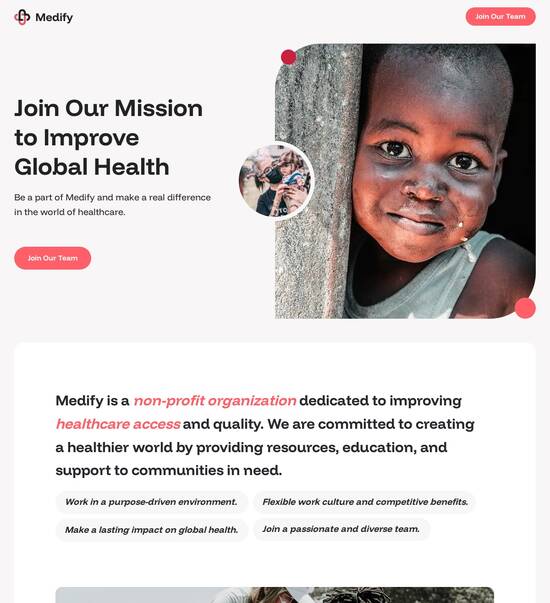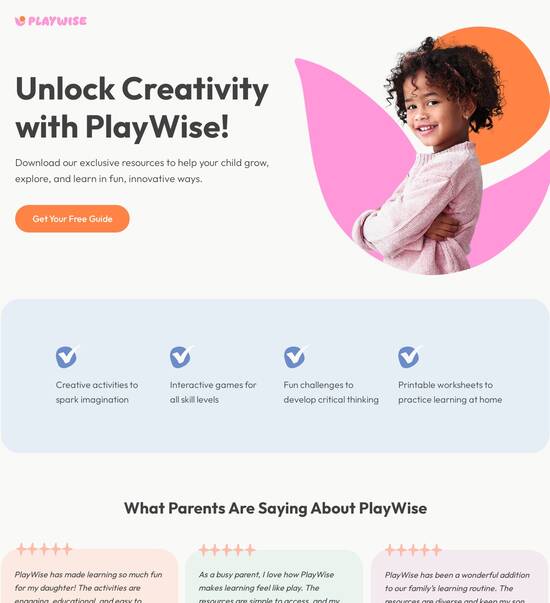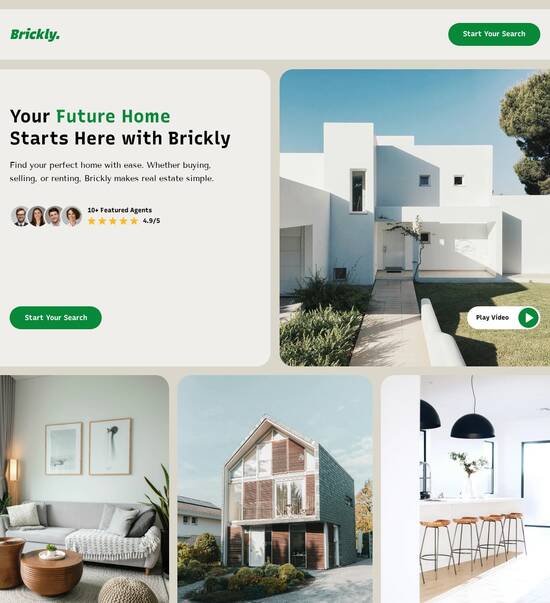
Responsive political website template
Explore Similar TemplatesAbout template
Drive more leads with Instapage responsive political website template built to maximize conversions. Easy customization - no designer or coding skills needed.
Recommended templates

Easy to build without coding
With the intuitive drag-and-drop builder, anyone on your team can create high-converting pages without any knowledge of code or design. Make enhancements to your landing page with custom widgets using Javascript, HTML/CSS, or third-party scripts.

Multiple layouts for any industry and goal
Select from 500+ landing page layouts built to boost conversions across industry-specific scenarios. Customize them by adjusting fonts, adding images, and generating on-brand content with the AI assistant. Quickly scale with Instablocks® and Global Blocks that you can save, reuse, and update globally.

Loads fast and looks polished on any device
Every template is responsive, which means they present professionally on any device and load blazingly fast with our Thor Render Engine. You can also power them up with Google AMP technology to deliver an unparalleled mobile experience and drive higher conversions.

Robust analytics & experimentation
Get real-time updates and reporting across all your devices, showing the number of visitors, conversions, cost-per-visitor, and cost-per-lead. Launch AI-powered experiments, run A/B tests, and use heatmaps to analyze user behavior, then optimize your landing page to maximize conversions.







Easy to build without coding
With the intuitive drag-and-drop builder, anyone on your team can create high-converting pages without any knowledge of code or design. Make enhancements to your landing page with custom widgets using Javascript, HTML/CSS, or third-party scripts.
Multiple layouts for any industry and goal
Select from 500+ landing page layouts built to boost conversions across industry-specific scenarios. Customize them by adjusting fonts, adding images, and generating on-brand content with the AI assistant. Quickly scale with Instablocks® and Global Blocks that you can save, reuse, and update globally.
Loads fast and looks polished on any device
Every template is responsive, which means they present professionally on any device and load blazingly fast with our Thor Render Engine.
Robust analytics & experimentation
Get real-time updates and reporting across all your devices, showing the number of visitors, conversions, cost-per-visitor, and cost-per-lead. Launch AI-powered experiments, run A/B tests, and use heatmaps to analyze user behavior, then optimize your landing page to maximize conversions.
All the features you need to build lead-generating landing pages
Explore more featuresLearn how to build top-performing landing pages for any goal
FAQs
Leading the way in building high-performing landing pages





Maximizing ROI with Instapage: Your Step-by-Step Guide to Effective Landing Pages
Creating effective landing pages is crucial for enhancing your digital marketing campaigns, especially in competitive sectors like business services, tech/SaaS, and education. With Instapage, the most powerful landing page and conversion rate optimization (CRO) platform, marketers can maximize their return on investment (ROI) through a streamlined approach to page creation and optimization.
Understanding the Importance of Landing Pages
Landing pages serve as the focal point of your marketing efforts. They are designed to convert visitors into leads or customers by offering compelling content and clear calls to action. A well-optimized landing page can significantly enhance your lead generation, thereby increasing your campaign's effectiveness.
- Clarity: Ensure your message is clear and resonates with your target audience.
- Call-to-Action: Position strong CTAs to guide users towards the desired action.
- Visual Appeal: Use engaging graphics and themes that reflect your brand and message.
Step 1: Create Your Landing Page
Utilize Instapage's vast library of over 100 templates to launch your landing page without the need for coding. The intuitive drag-and-drop builder allows for easy customization, ensuring that your page meets your specific marketing goals.
Step 2: Optimize for Conversions
Implement built-in experimentation features to enhance conversion rates. Use heatmaps and A/B testing to gather data on user behavior and iterate your designs accordingly.
- A/B Testing: Compare different versions of your landing page to see which performs better.
- Heatmaps: Analyze where users click and how they interact with your page.
- Analytics Dashboard: Monitor key performance indicators to assess your page’s effectiveness.
Step 3: Personalize User Experiences
For maximum impact, personalize your landing pages for different audience segments. Leverage Instapage's dynamic text replacement to align your content with the specific needs of various personas.
- Dynamic Text Replacement: Automatically adjust content based on user demographics.
- AdMaps: Strategically match your ads to relevant landing pages to enhance user experience.
- Audience Segmentation: Track metrics to evaluate performance based on specific groups.
By following these steps, you'll not only create impactful landing pages but also significantly boost your marketing performance.
Ready to elevate your digital marketing strategy? Start today with Instapage and discover how easy it is to create high-converting landing pages that engage and convert your audience.
Understanding responsive political website templates
Understanding the need for responsive political website templates
In the fast-paced arena of political campaigns, having a robust online presence is non-negotiable. With voters increasingly relying on digital platforms for information, a candidate's website serves as a primary avenue for engagement. A strong online presence can be the deciding factor in attracting voter interest and support.
Voter engagement strategies, such as live chats, newsletters, and interactive content, can significantly enhance the chances of winning over the electorate. Therefore, accessibility plays a crucial role. With responsive political website templates, candidates can ensure that their message reaches supporters through all types of devices—be it smartphones, tablets, or desktop computers.
Modern templates not only offer streamlined designs but also enable quick deployment. This is essential during crucial campaign periods that require immediate action and adaptation. When a website provides an enhanced user experience, it helps transform casual visitors into committed supporters, increasing the likelihood of donations and active participation in the candidate’s activities.
Key features of responsive political website templates
One of the most significant advantages of responsive political website templates is their flexibility and adaptability. These templates are designed to be compatible with various devices, allowing voters to access information effortlessly, regardless of their chosen platform.
Multi-device compatibility ensures a seamless experience on mobile phones, tablets, and desktops.
Fluid grid systems allow templates to automatically adjust to different screen sizes, enhancing accessibility.
Furthermore, user-friendly customization options make it easy for campaign teams to tailor the website to fit specific branding needs. Intuitive drag-and-drop builders allow users to modify layout without any coding knowledge. Moreover, the availability of child themes enables teams to maintain brand consistency while also experimenting with different designs.
Integration with essential campaign tools is another feature that cannot be overlooked. Many templates come equipped with plugins dedicated to fundraising and event management. Social media integration can amplify outreach, giving campaigns the opportunity to extend their engagement strategy across platforms where voters are active.
Lastly, SEO optimization is integral for ensuring maximum visibility. Built-in SEO techniques help improve search rankings, while schema markup and tailored meta tags can specifically attract voters searching for information about candidates and their platforms.
Exploring design elements of political website templates
Design plays a vital role when it comes to political website templates, as it needs to reflect the values and ideologies of the campaign. Thematic designs help candidates resonate with their audiences. For example, templates can be customized to reflect the specific colors, logos, and values of a political party, effectively communicating core messages.
Customizable themes that are adaptable to varying campaign narratives.
Strategically organized content layout ensures easy navigation, providing a good user experience.
Effective layout strategies anchor the user experience in simplicity and accessibility. A well-structured hierarchy allows visitors to find information easily, leading to increased engagement. Call-to-action buttons positioned strategically can prompt users to donate or volunteer seamlessly.
Memory and impression retention are often influenced by visual storytelling. Therefore, incorporating high-quality images and engaging multimedia content—like videos or infographics—will hold audience attention. Interactive elements, such as polls and surveys, not only increase engagement but also provide valuable insights into voter opinions and preferences.
Building a responsive political website: step-by-step
Creating a successful political website starts with selecting a suitable template. Factors like design flexibility, customization capabilities, and essential integrations should guide candidates and organizations in making their choice. A solid design starting point can lead to a stronger foundation for a candidate's online presence.
Consider your target audience to ensure the design aligns with their preferences.
Ensure the template is mobile-friendly to cater to a broader audience.
Once a template is chosen, the next step is the customization process. Modifying themes and child themes allows candidates to plug in personalized content that reflects their campaign messages and values. This step is crucial for creating a distinctive online identity.
After customization, it’s essential to implement plugins and resources that boost website functionality. Essential plugins for donation systems and event calendars increase operational efficiency. Additionally, resources for improving site performance should not be neglected, as fast-loading websites enhance user experience.
Benefits of utilizing responsive templates for candidate campaigns
The advantages of responsive templates are vast when it comes to enhancing user engagement. A responsive design can dramatically reduce bounce rates as users find it easier to navigate, encouraging them to explore the site further.
Lower bounce rates lead to prolonged user engagement.
Improved navigation reduces the frustration often associated with poorly designed sites.
Increased conversion rates are another key benefit. A responsive design combined with effective call-to-action placement raises the likelihood of users donating or signing up for newsletters. Optimizing landing pages to focus on specific voter segments can further amplify these results.
Efficient management and updates are vital during campaign cycles where information changes rapidly. The ability to make real-time updates ensures voters have access to the latest information about the candidate, policies, and events, fostering greater trust and transparency.
Best practices for maintaining an effective political website
To maintain an effective political website, regular content updates are essential. Fresh content improves SEO rankings and keeps voters informed about campaign progress and key announcements. Blogging and news sections can serve as powerful communication tools to connect with the audience.
Consistent updates signal an active campaign, drawing more interest.
Utilizing blogs provides an platform for in-depth discussions on policies.
Monitoring and analyzing performance is crucial for adapting strategies based on user behavior. Utilizing tools to track website analytics will provide insights into user engagement and popularity of specific content.
Ongoing compatibility must also be ensured, as technology rapidly evolves. Keeping templates and plugins updated will safeguard against security vulnerabilities while also maintaining smooth functionality across various devices and browsers.
Case studies: successful political campaigns utilizing responsive templates
Examining high-impact campaign websites reveals the effectiveness of using responsive templates. Many successful candidates have leveraged these tools to create engaging, user-friendly sites that resonate with voters, leading to increased outreach and support.
Effective themes reflect party values while ensuring ease of navigation.
Analysis of engagement metrics shows higher voter interaction compared to competitors.
Learning from diverse party strategies offers valuable insights. Understanding how different political entities customize their approaches to their constituents can inform future campaign strategies. The key takeaway is the necessity for effective, responsive design that not only relays information but also engages voters.
Future trends in responsive political web design
The future of responsive political web design is poised to see emerging technologies and innovative approaches take center stage. AI-driven customization and personalization will allow campaigns to tailor their messaging at an individual level, improving connectivity with potential voters.
AI can analyze voter behavior to create targeted campaign content.
Emerging technologies could enable interactive experiences that facilitate deeper voter interactions.
Additionally, accessibility will become increasingly important. Designing for inclusion will not only align with ethical standards but also align with anticipatory legal standards that may soon evolve. Candidates must think broadly about their web outreach strategies to ensure they cater to all voters.
Realizing the full potential of responsive political website templates
To realize the full potential of responsive political website templates, candidates must prioritize authentic connections with voters. Storytelling through campaign content can be powerful in humanizing candidates and solidifying voter trust.
Using narratives to highlight personal experiences fosters relatability.
Transparent communication builds credibility which is vital in gaining voter support.
Fostering community engagement is another critical aspect. Encouraging civic participation via web features, such as forums and user-generated content platforms, invites feedback and strengthens community ties. Listening to voter feedback is not only an avenue for improvement but also creates a relationship grounded in trust.
Ready to skyrocket conversions?
Supercharge your ad campaigns with high-performing landing pages
Get started














